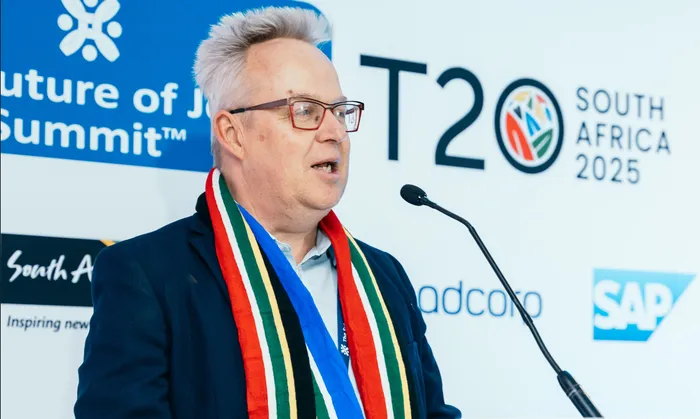Prosper Nation: How LIV Golf and other global events can become South Africa’s next growth engine

Dr Nik Eberl is the Founder & Executive Chair: The Future of Jobs Summit™ (Official T20 Side Event) .He will be writing a regular column in Business Report.
Image: Supplied
When LIV Golf announced last week that it will bring its global tour to South Africa in 2026,the headlines naturally focused on star power, prestige, and prize money. But beneath the spectacle lies a far more important story: what events like LIV Golf — and potentially Formula 1 at Kyalami — could mean for South Africa’s economy if handled strategically.
We’ve been here before. In 2010, the FIFA World Cup delivered not just goals and trophies,but R93 billion in GDP impact, more than 130 000 jobs, and the highest visitor satisfaction scores in the tournament’s history (a 92% Net Promoter Score). It was a masterclass in how a global event can lift tourism, boost infrastructure, and rebrand a nation.
The challenge now is not whether South Africa can host. We’ve proven we can. The challenge is whether we can turn events like LIV Golf, Formula 1, and other global draws into recurring, compounding growth engines — not just one-off bursts of excitement.
Lesson 1: Treat Events as Economic Platforms, Not Just Entertainment
In 2010, the World Cup’s biggest impact came not from the matches, but from the industries it touched: tourism, construction, media, retail, and national branding. LIV Golf and Formula 1 can offer the same — if we broaden the lens.
- High-Value Tourism: Golf and F1 attract premium travellers who spend more, stay longer, and often combine events with safari, wine, and cultural itineraries. Golf tourists alone spend up to 120% more per day than the average leisure traveller.
- Year-Round Impact: LIV Golf is one event, but can anchor a series of pro-am tournaments, youth clinics, and regional golfing showcases, spreading benefits beyond a single weekend. Similarly, Kyalami can become a hub for trade expos, STEM festivals, and corporate summits, beyond the Grand Prix itself.
- Global Branding: Both events deliver massive exposure — F1 races reach 1.5 billion global viewers annually, while LIV Golf’s streaming and broadcast partnerships willshowcase South Africa as a world-class destination for both sport and investment.
Lesson 2: Build Smarter Public-Private Partnerships
In 2010, the state carried most of the cost. Today, fiscal constraints mean we need to be sharper. LIV Golf, with its deep-pocketed investors and brand partnerships, and Formula 1, with its global sponsors, create opportunities for cost-sharing and revenue generation.
- Sponsorship and Hospitality: Premium ticketing, sponsored fan zones, and corporate hospitality packages can offset operating costs while boosting tourism receipts.
- Trade Linkages: Pair these events with South Africa Investment Summits, inviting CEOs and investors already attending to explore sectors like green energy, tech, and advanced manufacturing.
- Global Brand Alignment: Brands like Emirates, DHL, and Heineken — already heavy investors in sport — can co-fund marketing that benefits both the events and South Africa’s nation brand.
Lesson 3: Focus on Skills and Legacy, Not Just the Headlines
The World Cup left two lasting legacies: a trained workforce and upgraded infrastructure. But it also left us with “white elephant” stadiums that struggle for relevance. LIV Golf and Formula 1 must lean into skills transfer and industry development to avoid repeating that mistake.
- Tourism and Event Skills: Each event can train hundreds of young South Africans in logistics, hospitality, broadcasting, and digital media — skills they can use globally.
- Industry Growth: Motorsport can drive local innovation in green fuels, EV tech, and engineering, while LIV Golf can boost our sports tourism and hospitality sectors by connecting local entrepreneurs to international networks.
- Recurring Value: These aren’t one-off tournaments. LIV Golf has the potential tobecome a multi-year fixture on the calendar, while Kyalami could anchor a 10-year F1 franchise, compounding benefits annually.
Lesson 4: Make South Africa the Star, Not Just the Venue
In 2010, the “Ke Nako” campaign showcased the country — its beauty, culture, and business potential — as much as the football. LIV Golf and F1 can serve the same purpose:
- Tourism Campaigns: Market South Africa as a luxury and adventure destination before, during, and after these events.
- Cultural Showcases: Integrate local music, food, and entrepreneurs into fanexperiences and broadcasts to create a “South African signature” that lingers beyond the event.
- Media Leverage: Partner with broadcasters to weave South Africa’s narrative — as an investment hub and world-class destination — into global coverage.
Lesson 5: Think Decade, Not Weekend
The World Cup was a one-month high. LIV Golf and a potential F1 Grand Prix can deliver annual, repeatable growth if structured right.
Consider the benchmarks:
- The Singapore Grand Prix has generated $1.5 billion in tourism receipts since 2008.
- The Mexican Grand Prix adds $500 million annually to the economy and employs 8 000 locals each year.
- Golf tourism globally contributes over $20 billion a year — and South Africa, with its courses and scenery, could capture far more of that market with LIV Golf as a flagship.
The Bottom Line
South Africa doesn’t just need another spectacle. We need events that act as growth engines, attracting visitors, skills, and investment while boosting national pride. LIV Golf’s 2026 tour and the potential Formula 1 return to Kyalami aren’t just sporting headlines —they’re opportunities to turn our proven ability to host into a strategy for long-term prosperity.
The lesson from 2010 is clear: the world will come to South Africa. The question now is —will we turn their visit into a decade of growth, or just another fleeting celebration?
Dr Nik Eberl is the Founder & Executive Chair: The Future of Jobs Summit™ (Official T20 Side Event) and uthor: Nation of Champions: How South Africa won the World Cup of Destination Branding.
*** The views expressed here do not necessarily represent those of Independent Media or IOL.
BUSINESS REPORT